|

Peering beyond the autumn sunset.
(*photo credit)
November 1, 2012 Saints Who Are Spiritual Resources
On All Saints Day we honor those who were striving in life to do the best they could -- and have now passed on to the Lord. Those who seldom think about the deceased find this a trying day, for they overlook an extended community that embraces those who died and those who live among us. To honor "saints" as friends and co-workers with the Lord is to be part of this real and wider community of those struggling on Earth, those who have not quite arrived and are being purged of wrongdoing, and those who have attained the Glory of Divine Presence.
On the day the first draft of this reflection was composed, our parish's 98-going-on-99-year-old matriarch and great, great grandmother passed from this mortal scene. In my last visit with her I thought she had months left, and yet she was praying for the great transformation to occur soon, very soon. Shortly after my visit she died peacefully from what could truly be called "natural causes." Virginia had been a pillar to our Church and local community, attending Mass when she could, remembering all in need through charity and verbal support, caring for relatives and friends, promoting parish benefits, serving on the board of the local hospital, and having the distinction of being one of the last one-room school teachers in our Commonwealth.
Virginia's presence is sorely missed, but is it really that removed? Saints are with us and we as Church testify to this on this feast day. People do not die and vanish leaving only a fading memory of their relationships and perhaps some audio, video, or written records for temporary keepsakes. Rather, good people are now part of the community of the glorious, and thus shine before our universe like stars. But they are not lifeless heavenly bodies but real persons eternally alive to help us in some manner. They are part of God's company of companions who are near and dear to us in our present striving to follow them at the proper time.
Most of us will honor a chosen few with public signs of respect such as attending a wake, or offering flowers or money for their designated cause. We may be respectful enough to recall those nearer to us on anniversaries, and even offer prayers for them. However, do we ever pray TO them for guidance and assistance in helping us in our ongoing struggles? We could use all the help we can get in this troubled world, for our own incomplete journey is uncertain but saturated with hope. Their mortal journey has ended but ours is still in process. They made it; they did not lose courage; they were faithful in completing the race; their crown is something that they humbly wear and want to share. It is important for us to ask a basic question: do we have friends who will help us if we but choose to ask?
Prayer: Grant us, Lord, to experience in some way the company of the heavenly hosts and to understand that our departed friends are willing to help us in the many ways we need assistance.

Water droplets on November leaf.
(*photo credit)
November 2, 2012 Dying with Dignity
On this day we recall the Holy Souls, those loved ones who have gone before us. We reflect upon their passing, their incomplete journey often cut short by untimely events. Many of us regret not being present at another's death or for not expressing compassion to them while they were among us. Note that in today's culture of death those advocating euthanasia regard that deliberate hastening of death to be a "dignified way" to go, rather than suicide. We must muster the courage to say that this is a horrible way to end a well-spent life. We need not prolong the passing, but we are not the author of life and ought not shorten the length of this precious gift of time. In a meaningful manner, these final days can be a teaching moment for all who are near.
Expressions in parting: We ought to seize the opportunity to say kind words to the dying, and even honored the custom of giving someone "permission to die" (January 22, 2011), which is really taking leave of a person and saying that, while painful, this is needed for the betterment of all. Each of us must bow to God's will: the dying and those who must let go of them. We honor the gift of life and regret the separation, but we express hope of future gathering with them beyond the great divide.
Circumstances in parting: Hospice care has been a major Godsend in this modern world. Controlling pain and a comfortable setting surrounded by loved ones are elements of what most desire when departing this life. Top choices of place of dying are either in special hospice centers or at home; being surrounded by a company of loved ones is important. Cheerfulness and dedication of hospice workers are key ingredients to an environment of a proper passing. Loved ones do all they can when natural processes take their course. Cheerfulness in such circumstances is always a challenge. Unfortunately, some die unattended, perhaps victims of accidents or misdeeds. We pray for accompaniment at the hour of death and for words of comfort in such trying times. Let's continue to pray for a happy death and for support of others.
On this November day we can afford some basic preparation in the "unlikely but inevitable" event of our passing: place of the funeral, wake and disposal details, person designated to conduct the services, songs, stories and other tokens of remembrance for wake or funeral service, choice of pallbearers and funeral directors, details of public viewing or its omission, and even elements of an obituary notice. Preparing these matters ahead of time is a blessing for those burdened by the short period between death and final services. Let's also not omit a listing of special relatives and friends who would feel hurt by being overlooked. If these materials are assembled in an accessible place, a hurdle to passing has been resolved on this November Day.
Prayer: Lord, help us to remember those in the stage of passing on, and to offer our services where possible by making a funeral an event of dignity for all concerned.
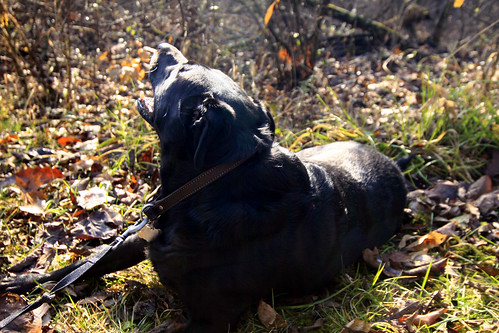
A yawn to greet the morning sun.
(*photo credit)
November 3, 2012 Challenging the Aristocracy of Wealth
We can have concentrated wealth in the hands of a few or we can have democracy. But we cannot have both. Louis Brandeis
Is our democratic process ensured and our vote "free?" Have we arrived at a rude awakening that we have a somewhat hidden and unchallenged aristocracy that is deeply ingrained and desperate to establish its legitimacy? Are we unable to break the hold of that seemingly shadow form of government because the power of hidden wealth controls media and thoroughly propagandizes our citizens? Instead of being free, are we as a people voting as told?
First, since laws were instituted to legitimize excessive economic resources that belong to all God's people, the wealthy have been able to be the grossest of tax cheats and store some 22 to 31 trillion dollars of wealth in holding places or tax havens. Their well-oiled propaganda machine allows them to distract the public on food stamp cheats or those buying soft drinks with their food stamps. To focus on the poor allows voters to omit concern, but the real culprits get away with little or no taxes on their vast profit. Hypocrisy at its utmost!
Second, the issue of fairer taxes is difficult but has been largely overlooked by a voting public well concerned about who is to pay for their future. The idea of no new taxes when some are getting away without paying their fair share is hard for some to swallow, but this is overlooked by a public bent on what is the best for me and only me. The common good must be considered when voting, for it is what affects all citizens and a broader world. A purchased or stolen election or failure to address fair taxes will ultimately lead to insurrection as happened in history (e.g., after the Revolutionary War in 1792 with the Whiskey Rebellion). It could easily happen again with rebels having more lethal weapons than rustic farmers with muskets in the 18th century.
Aristocracy is in power only as long as the public citizenry accepts it. Certainly, such power is not from the hands of God, for the Scriptures speak out strongly for the poor and the rights of people to a proper livelihood. Does the voting majority see at this time that a shrinking middle class is due to the power of the large banks to control sixty percent of American wealth, now in the hands of a few overpaid and undertaxed executives? Greed is behind these hidden aristocratic structures of what was intended to be a maturing democratic process. Reflection and a proper discernment in voting are needed. People are caught in the game of staying economically ahead and staying out of deeper debt. Thus, all too often, they vote their pocketbooks without recognizing influences that are at work limiting their opportunities. Are we prone to show wisdom in deciding or are we prone to follow false dreams? Perhaps we will help create that answer next week.
Prayer: Lord, give to each citizen the wisdom to vote properly and to understand the issues and people for whom they vote.
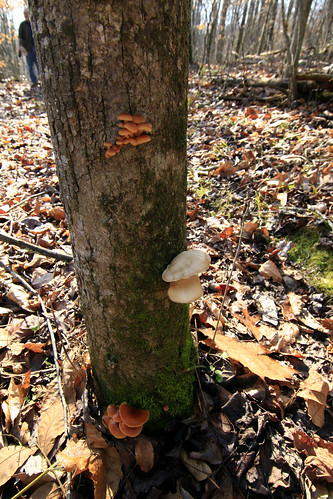
Standing log, full of life.
(*photo credit)
November 4, 2012 Love of God and Considering Our Mortality
I look at you and think about things that never come to an end
because God has watched them and cannot forget them...
One night we will shut our eyes,
the rest belongs to wind and foam
but love will live on. Leopoldo Panero
In this first Sunday of November and immediately after the feasts of All Saints and a day remembering holy souls, we retain mortality as a central theme. Some spiritual writers such as Jose I. Gonzalez Faus say that we ought to think about death daily but in a peaceful manner. The combination of love of God (today's homily theme) and our own passing could be worthwhile, especially for all of us who struggle to love God with everything we have at our disposal. In fact, the challenge is to seek happiness that comes with being close to God, and the comfort of this overcomes an uneasiness associated with morbid thoughts of death.
Through today's readings we strive once more to balance love of God and love of neighbor. But these are not two inseparable components of our spiritual life; rather, we discover that they are part of an infinite ocean of Love. Even in the midst of a reflection on our mortality we discover peace, for we realize that we express love of God through love-filled service to neighbor, and we love neighbor all the more as we seek to grow in love of God. Rather than this becoming a juggling act that never allows us to control the separate elements, we discover a oneness in love because God is love and God is the holy one.
Having said this, we return to the uncomfortable thought of death. Perhaps, this is a struggle of reconciling ourselves, for we know that wisdom consists in knowing the shortness of our lives and with each passing loved one, that awareness becomes all the more vivid. But should it be disconcerting if we place this in the context of love -- something eternal that will last way beyond the final date on our tombstone? If we reflect daily on our love of God, so ought we to see a goal up ahead where death is a passing and a birth to eternal life of love. The reflection gives us comfort and dissuades us from doing stupid things, because our goal of what lies ahead is too grand to be tarnished by imperfections.
Our reflection extends beyond our individual passing from this world for we already enjoy communion with those holy ones who have passed on. This communion of saints draws us forward, a teleological magnetism attracting us to the beyond. Neighborly service is not restricted to the here and now, but extends to the out there and then. We are cautioned not to spend too much time speculating on visualizing the future. In a growing sense of mutual togetherness, we are able to think peacefully about our mortality on a daily basis -- the ever closer hour of our death.
Prayer: Lord, give us the grace to love all the more deeply
and to see this as an eternal love, an eternal NOW.

A touch of frost.
(*photo credit)
November 5, 2012 Don't Forget: The Voiceless are Hurting
Though numerous voters have already mailed in their ballots, still the great majority will vote in national/local elections tomorrow. There are a host of issues, some of greater importance than others. We cannot reduce this election to a shrug or yawn; the very nation' policy on the manner of treating the poor and ill are at stake. All too often our primarily concern is whether I will be personally better off with this or that candidate, all the time forgetting that individuals (of whatever power status) can only do so much. A conscientious citizenry with more concern about "we" rather than "me" can do wonders.
We have heard many charges and countercharges, but how many candidates for public office have courage to get to the heart of the issue -- the right to a job -- and a livelihood. The heart of this issue is hurting people, those who need to have food handouts even though this approach lacks normal dignity. Such people have often been propagandized by paid-off think tanks that make them believe that Christians must hold out their hand for charity and be thankful in doing so. All too often, "charity" is a powerful weapon used on those who are rewarded for being obedient and lacking in leadership experiences. Let's change this.
Our response depends often on the rarely discussed concepts of social justice, for we are people in solidarity with others and we must help establish a livelihood for all people. Over and over, we have reflected on social justice as a component for healing our wounded Earth. All people have a right to share in the commons, have a job, and acquire a means of livelihood. To deny people this opportunity because of the sacrosanct concept of a wealth-based aristocracy retaining ill-gotten goods is to condemn people to a perpetual underclass. We must be in solidarity with others, with the young, elderly, mentally disabled, imprisoned, and those who feel too depressed to go to vote. These have little or no voice except the faint whimper of people in pain. Personal security is linked to the well-being of those with economic insecurity.
This is not a single issue election, but rather a choice of two major directions for us, our country, and our world. As a people we are to make a decision. Please reconsider issues in light of overall views on how this world is to be directed. Let's hope and pray that what must be decided will be for the benefit of all. We can make a difference if we vote wisely. Recall once more that no party is perfect, or policies fully satisfactory. With God's help we can make wise choices.
Prayer: Lord, give our people wisdom and understanding, and help them find available time to think through with a clear conscience the way they plan to vote tomorrow. Let each take their citizenship seriously and exercise it with prudence.

A single fallen leaf makes striking impact.
(*photo credit)
November 6, 2012 VOTE ON ELECTION DAY
Are the four words of this title sufficient for an American citizen today? Perhaps, but we never let well enough alone.
* Rise in the morning with a positive outlook.
* Here is one day truly to refrain from listening to the chatter of the pundits, for they may know no more than you.
* Engage those who see no need to vote with the argument that if they feel the situation is hopeless the feeling is contagious and will affect others, not only locally but throughout the land.
Failure to vote is a partisan position.
* Remind procrastinating friends to vote. If friends, they probably think like you and will augment your vote. Maybe they are going to secretly cancel your vote, but that is a mirage, for strictly speaking no one voter really cancels another in large numbers. Matching Congress members does have that effect when total numbers are known and are needed for one measure or another.
* For the confused, advise them to say a prayer before they make up their minds. The Spirit can and will enlighten them.
* Smile a little more today for cheerfulness brings out all voters, not merely the grim and determined ones.
* Conversation while standing in line to vote is okay, for you may be able to influence another in one of their less knowledgeable voting areas -- or vice versa.
* If time and energy permit, make that last lobby pitch for your favorite candidate, especially if the election is expected to be close.
* If still more time and energy surfaces, volunteer to drive a disabled or senior person to the voting place.
* Don't forget to vote yourself if you haven't done so.
* Clear the decks to prepare for a long evening of returns and assemble your tally sheets. There is a published reproduction of President Abe Lincoln's tally sheet as he awaited at the War Department's telegraph office on that Tuesday in November, 1864.
* Say a prayer that the best candidate wins.
* Prepare to retire at an early hour so you can be rested for tomorrow, no matter what it brings.
Prayer: Lord, teach us to be good citizens, to understand and take seriously the mandate to participate in elections, and to exercise our right to vote with knowledge and dignity.
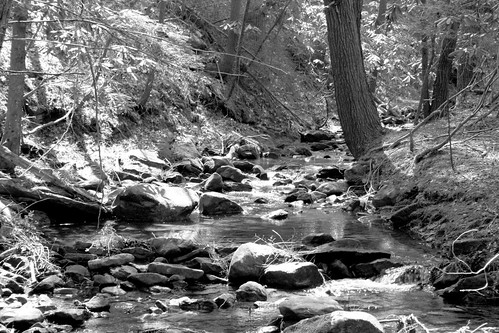
Along Sugar Run. Cumberland Gap National Historical Park.
(*photo credit)
November 7, 2012 Worker Safety at Portsmouth Diffusion Facility
A few months back our Earthhealing team visited some dedicated folks in the Ohio Valley and heard their story of what has been happening at the Portsmouth Diffusion Facility in southeastern Ohio -- a major component of the U.S. atomic energy enrichment system. This facility is where Russian surplus atomic warhead materials have been recycled and ingredients returned for nuclear power electricity generation. We were given a four-hour fact-filled demonstration by ex-workers as to worker safety issues related to the facility since 1993. Their documentation is impressive.
We were contacted because we are striving to carry on some of the work by our late associate, Mary Davis, of American and French nuclear power fame. These whistleblowers told us that Mary was the only independent investigator who uncovered a hint of what these who were inside the plant knew. Individual radiation dose records were being destroyed or doctored; responsibility related to medical monitoring of workers is in jeopardy for lack of sufficient evidence to obtain workers' compensation. After our visit we read an impressive pile of documentation and contacted media people in hopes of carrying this issue forward. This has been difficult in an election year amidst 24-7 daily blizzards of information. Do good stories have a chance?
Legally-mandated radiation dosage records have been conveniently lost or in a few critical cases doctored by plant managers more interested in safety of their position than that of worker safety. Though smaller now, over three thousand workers were on the plant grounds when the first missing record was spotted two decades ago. A serious accusation is that court records were changed to suit facility managers. In a nutshell, the IWA (Injured Worker's Advocate) demands that plant worker safety and the proper record-keeping be available and that illnesses be at least partly attributed to plant conditions.
Since proof of excessive radiation is missing, a further workers' demand is for health monitoring at facility expense (different owners/operators over the two-decade period) for their lifetime and that of their offspring, due to possible radiation carryover effects. Monetary costs frighten each congressmen contacted and involved, including Kentucky Senator Rand Paul. What about costs to human health? Workers need ongoing monitoring.
The Huntington News of West Virginia ran an article on September 3, 2012 entitled "Piketon, Ohio Document: Up to 70,000 Dosimeter Readings 'Changed'" by Tony Rutherford. This was the first of a series on the safety at that facility. If interested in this somewhat complex issue, please contact IWA Jeffrey Walburn at <walburnn@windstream.net> or Charles (Chick) Lawson at <chick07@juno.com>.
Prayer: Lord, inspire members of Congress to overcome their fright and accept this as an issue worth acting upon.
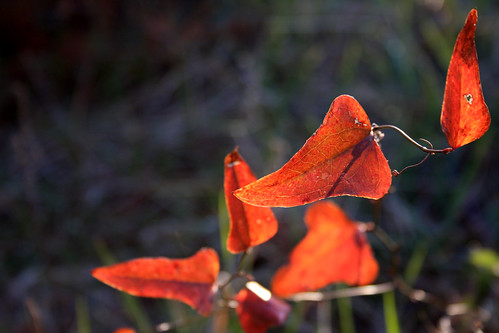
Turning leaves of the smilax vine.
(*photo credit)
November 8, 2012 The Act of Passing On and Passing Over
In high autumn, a season of passing glory, we recall that we use our English word "pass" both as noun and verb in countless ways. The word conjures up images of football plays, entertainment tickets, academic grades, geographic features, highway road trips, and vast theological imagery of the "Passover." Some of these pass words refer to avoidance (pass up) and others to success (pass through). Passing out refers to drunkenness or fainting or distributing, and passing away is the polite form of speaking of someone's death -- and this has deeper meaning than just not facing death by survivors. In fact, some may go through a death of a loved one and never use any terms but "pass" with a proper preposition. Let's focus on two: passing on and passing over.
Passing on is our manner of speaking about the person who was with us until recently, and now the contact is broken. Passing on is a polite way of describing death to the more sensitive, the passing on from a mortal to an eternal state for believers. However, the transition is colored by regret on the part of acquaintances. We can also speak of the year itself passing on amid actual or delayed frosts, and the loss of sensitive plants that have gone unprotected. Passing on seems a natural sequence, for natural forces play their heavy hand in autumn's passing.
Passing over has a faith-filled aspect of looking to the future, and not only to a past era now gone. Even the language of church funeral prayers bear this sense of moving from one state of life (mortal) to another state (eternal). For believers in the resurrection of the body, life is a passing from one form to another. The "Passover" harks back to Old Testament themes of sparing those who are designated chosen people, traveling across the Dead Sea to the land of promise, and passing from old ways to new ones being memorialized each year. In the New Testament Jesus' Passover is observed as part of the Last Supper and beyond, and so Christians celebrate the Passover event on Holy Thursday. When applied to each individual, this means that mortal death is a metamorphosis, a passing over to new life. Now sadness turns to joy through a future transformation overcoming a past limitation.
Passing into high autumn bears both the mark of a passing warm season, and a passing into winter sleep after which spring will surely follow. We are once more reminded that we are not owners of our time, only ones who use it well or badly. Future hope stretches beyond passing seasons, even for those who enjoy likeable vacation times that pass too fast. For those who await a new transition, there is the hopeful anticipation; for them, there is no definitive abandonment but an eternal life ahead, a home yet to be realized and awaited with spiritual joy. With time we gradually see passing on giving way to passing over. Eagerly we await the passing into eternal life.
Prayer: Lord, teach us to learn to leave the old behind and to prepare ourselves for a grand passing over that is soon to come.

Autumn beauty of thistle plant. Mercer Co., KY.
(*photo credit)
November 9, 2012 Gun and Ammo Control: Why Private Arsenals?
Looking back on a youth with violence everywhere (the Second World War) and immersion in a gun-bearing society gives me pause. Am I not part of a gun addiction, which afflicts all of us today? We need a response to the 4,000 to 6,000 rounds of ammunition that was purchased (apparently online) by the Aurora, Colorado shooter. Violence breeds violence, and a nation that thinks it can maintain a delicate balance in a world of crazies is unrealistic in its assessment of itself. In America, the majority of the mentally incompetent are still able to acquire weapons (all but 844 of 35,461 "crazies" in Kentucky alone). Our insecurities keep us "addicted to guns" -- and these go deep into our national roots.
In 1775, General Gage (the acting governor of Massachusetts headquartered in Boston), first sent his troops to disarm the stirring colonists by taking over the communal gunpowder arsenal at Cambridge. Later that month of April he sent a second detachment twenty miles away to Concord where a common store of weapons and supplies existed. Colonists had private arms but a common store of ammo was located in specific places. Hence the Concord battle that caused casualties and introduced the Revolutionary War. Guns and ammo were in the conflict from the start.
The founding fathers of the Constitution saw the need for security and thus the "right to bear arms." It is one thing to have a front muzzle-loader, but it never entered their minds that private citizens would have automatic weapons at their disposal. Why such immense private power in the hands of the imbalanced? A permissive society cannot make distinctions and see that rights admit to degrees of utilization. Thanks to the powerful four- million-member NRA, the awesome power found in possessing guns (and ammo) is virtually universal in this country (whereas Australia with a conservative government has brought reasonable controls after a 1996 terrible incidence of gun violence). In a similar period, America endured sixty-five recorded cases of massive violence -- and untold movies to titillate the mentally imbalanced.
Governments are created for the good of society. National legislators controlled by gun lobbyists and profit-makers seem paralyzed and helpless. Ought we do more than offer condolences for victims when inevitable tragedies occur? We have three hundred million weapons loose and about, which could never be totally collected. But it takes sophistication to make and fashion ammo for them. Why not control ammo and allow only two or three shots (bullets) per person per hunting season? When young, we had guns but little costly ammo, and target practice was delayed to better financial times. Control ammo! Outlaw ammo for automatics -- a perversity of a Second Amendment, which assumed both social and individual rights and duties. The "right to bear arms" is a limited social right. Let's demand proper social controls.
Prayer: Lord, grant us a sense of balance in weaponry and give us courage to voice this openly and freely to a gun-loving society.
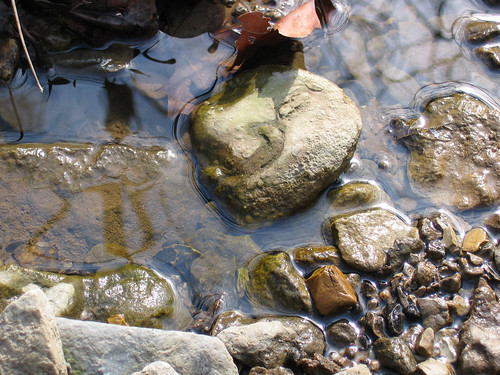
A prominent fossil formation in Bluegrass stream rock.
(*photo credit)
November 10, 2012 The Call to Universal Fellowship and Service
O praise the Lord, all you nations...(Ps 117:1)
This shortest of the psalms is a mere two verses that we recite or chant in morning prayer today. Brevity makes us pause more than longer passages. All peoples should extol God's glory, for divine love is strong and divine faithfulness is eternal.
Service is individual action for the benefit of others. For one brief moment in our busy lives we think about the goal of our work, a love of God expressed in our steadfastness to give service for others. Service is that most elementary expression of being godly. Our service is often directed to people next to us, or to neighbors or local communities; however, this service can be part of a global undertaking, a participation within the entire Body of Christ. Love of God involves giving to and for others selflessly. `
Selfless action is glory to God. The more selfless we can make this service, the higher the quality of the service we perform. Thus, by removing self from the equation, our service, though often locally based, becomes participation in a global enterprise both for others in social need and for our exploited Earth herself. In solidarity we enter into global action.
Faith is realizing an emerging glory. We believe that what we achieve in small ways will have a greater effect -- and that is a spiritual content that we cannot measure quantitatively, like making money or acquiring possessions. Faith realizes the potential value of helping others, no matter how small the service. It is not the quantity but the quality of the service, for in serving and wishing others happiness and good will, a often hidden spiritual globalizing effect arises.
Nations can give glory. We need not limit our thoughts to what individuals can do. We operate in a community and thus communal service fits into the patterns of individual actions. However, each communal action can be a faith act hopefully presented through an act of collective faith. When governmental bodies including nations assist in our service role and help us serve others, then the nation assists in giving glory to God, whether expressing this in pious words or not. The degree of freedom for citizens to serve is of utmost importance. When injustice does not allow people a livelihood, a disservice has been given and the brightness of glory is lessened.
Nations share fellowship. Communal service maximizes and encourages a deepening service of individuals, and the globalizing effects are enhanced. A global fellowship of maximizing citizen potential through their meaningful loving work and service is the goal of this short psalm, for all nations are called to praise God.
Prayer: Lord, your love and faithfulness is eternal; help us to realize this in our lives both individually and communally.
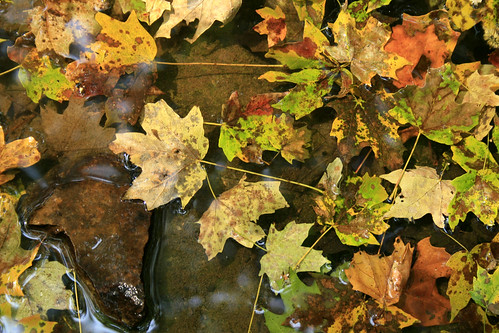
Colors of autumn, shed into Thompson Creek. Mercer Co., KY.
(*photo credit)
November 11, 2012 The Widow's Mite and the Power of Generosity
I tell you solemnly, the poor widow has put more in than all who have contributed to the treasury. (Mark 12:43)
We recall that Jesus watches a poor widow giving from what she has to live on though it is a mere small coin (see 11/12/06). Yet he regards her as the greatest of the donors because it came from her need and not from a surplus. Jesus invites us to see the power of being generous, no matter how small the amount. The Lord counts things differently, or else the Widow's penny would not have been worth more. The constant need for good stewardship and resources to handle immediate costs triggers the search for high value donors -- and thus poor folks are often overlooked. However, in the spiritual equation their donations are the important ones.
Radical sharing is at the heart of generosity, and yet we find it hard to practice, for it means to take from our surplus or even from what is our expected livelihood. When we were kids in the 1940s we had small "Sunday envelopes" in which we would place our pennies (in depression times these were valuable, for each could buy a piece of candy). Tearing open and tabulating such small offerings would be tedious today, but the generosity being taught was immense. We all start by letting go of little things: our time, talents, thoughts, and our daily treats; we part with our tiny treasures. Jesus invites the rich man who has kept all the commandments to give up his possessions and come and follow him.
That appeared to be too great an obstacle.
Proper and improper giving must be contrasted. Merely giving to proclaim one's name is all too often the result of peer pressure, desire for fame, or a subtle way to exert power. When billionaires give to effect change, that means they are the determining agent of change through the aristocracy of wealth, and this must be confronted within a democratic society. Proper giving is from the heart and not with the mind pondering the practical benefits of the gift given. Some say that altruism or selfless generosity is at the heart of being human -- though some forms of generosity may be practiced by animals as well.
Generosity is an ideal motivating force. Generous people become good teachers. In fact, if we believe in this power it will create a ripple effect going out to all the world. Generosity is the true currency of globalization, though we are unable to put its effect in dollars and cents. The generous have a faith that benefits for the needy will occur but not be ascribed to individual donors. At the same time, we can encourage the power of being generous and to forget what the hands are giving. A society bent on monetary gain has much to learn here, and a simple widow who puts in her penny has much to teach us all.
Prayer: Lord, inspire us to give and not to count the cost, but rather to give because we can only truly show our love in this
fashion, for you give so much to us.
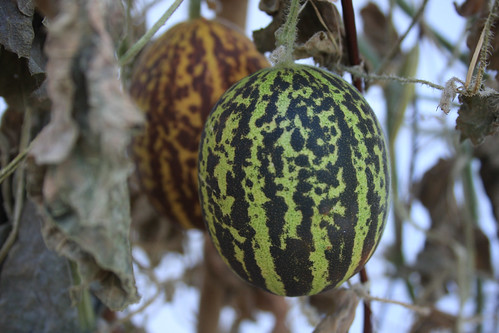
Plum granny (Queen Anne's pocket melon)- hardy Appalachian garden favorite.
(*photo credit)
November 12, 2012 Year-Round Garden Variety without a Greenhouse
This reflection is meant for the gardener who lacks a greenhouse and still wants fresh, year-round produce. It helps if the weather cooperates, especially in late summer when seeds are sown for winter crops. Obtaining garden produce in late spring to early autumn is not difficult; the problem is the non-growing season from first killing-frost to last freeze. These ideas help in planning for the 2013 garden year:
1. Don't delay. For winter crops, start sowing early (in our areas in mid- to late-August). Autumn crops may require constant watering in order to germinate and survive dry conditions.
2. Protection is key. Of course a heated greenhouse is ideal but temporary cold frames could also prove of great value at far lower costs. For green crops growing into the autumn, use Remay or other coverings that allow some air to circulate during sunny days. Minimize the air space above the produce to reduce the space needing daylight heating to fortify against cold nights.
3. Think variety. A major goal is to have salad greens in all seasons. Choose autumn seeds well (mustard, kale, endive, arugula, Swiss chard, and turnip greens). Go easy on delicate greens, such as most of the lettuce varieties. Brassicas (broccoli, cabbage, etc.) are difficult to carry over through summer heat and bugs to autumn and winter produce; some sow again in late summer or grow plants for autumn. I sow our South's favorite brassica, collards.
4. Include wild varieties. We forget that dandelions can furnish leaves well outside of spring and under leaf cover. In winter, chickweed grows well in covered areas. Also in various seasons consider plantain, poke, sorrel, and lemon grass.
5. Remember root crops. A variety of these can endure some or much of the winter including Jerusalem artichokes, salsify (oyster plant), Japanese radishes, some types of garlic, horseradish roots, carrots, turnips, onions, and parsnips.
6. Herbs make variety. Not all herbs are year-round, but some mints are green for many months. Parsley grows well both outdoors in summer and in indoor potted plants along with dill, basil, and others. Garlic in a green stage has a long growing season.
7. Respect warm weather varieties. Don't try to grow peppers, beans (peas do very well though), tomatoes, cucumbers, squash, or okra in cooler weather. They like it hot.
8. Control micro-climate conditions. Keep track of how the various types of produce endure the extremes of heat and cold. It may be necessary to protect summer crops with artificial shade.
Prayer: Lord, give us the creativity to garden wisely and the
expertise to spice our lives with variety.

Watts Creek. Woodford Co., KY.
(*photo credit)
November 13, 2012 Champion the Nobility of Being Poor
We may be tempted to speak of the "filthy rich" in a rather pejorative manner. We might also be tempted to regard the rich as "nobility," but use this term to mean privilege without duty. However, this is a misuse of terms for it is far removed from the stance of medieval wealth and power, along with sacred obligations due a person of public rank. The proper nobles gave service to kings and princes with civil and even ecclesial penalties that were associated with misuse.
Let's take that noble sense of nobility and relate it to the actions and insights of the poor today as responsible citizens.
It takes nobility to become disciplined enough to expect to be fed tomorrow when the source of food is uncertain. The poor learn to pray with sincerity and honesty, "Give us this day our daily bread." Realizing that we can thank God for gifts given allows that deep sense of gratitude wherein we find our humble but noble position before the Creator without pretensions.
Responsibilities by the poor do not necessarily include thanking the wealthy for what is rightfully ours as poor folks. The patience to continue to remain lowly while the privileged remain in their wealth is not virtue -- only a wishful hope by the wealthy that the status quo will go unchallenged. For too long some religious teachers have talked about patience as a virtue to be practiced by the poor. We do not have to exercise patience when we see that in doing so the wealthy are hastening their own demise. This is why "patience" that tells of staying in one's current lower status is quite misleading and a form of desecration of the sacred rights of all people to basics of life. We can become impatient when Christians hesitate to become overturners of tables of merchants who have seized the commons.
True responsibility rests with accepting our duty to motivate and enact all to take what is meant for their livelihood -- provided they do so non-violently. It is our duty to overturn tables of the world's moneychangers, to upset those who have taken from the commons what belongs to all people, and have turned this treasured but vulnerable Earth, our Father's house, into a den for the work of thieves. Jesus teaches the poor to take matters into our own hands when others are reluctant to do so. We must be of one mind and this takes a noble responsibility of not being sidetracked by friction, but living in solidarity with others.
Nobility comes in many forms. We are blind to seeing failures of a privileged class and need the sight of our American revolutionary forebears. Rather we ought to see the more noble demands of care for others and find true nobility among the poor in society so that they rise and serve the needs of their neighbor.
Prayer: Lord, give us the wisdom to see potential in the poor, not in a permanent groveling state, but in readiness to change the world for better -- a state of invited empowerment.

Rural tobacco barn, Washington Co., KY.
(*photo credit)
November 14, 2012 The Sensational Aromas of Autumn
I am working with Warren Brunner on a fourth book of his famous photographs and with the organizational and design skills of his loyal spouse, Pat. We are actually moving this book along far faster than I anticipated even though I wrote most of my text a decade ago. The title is Appalachian Sensations: A Journey through the Seasons. The Brunners have assembled a host of photos for each of the twelve months and each month has a set related to sight, sound, taste, smell, and touch. To these sixty possibilities I have related narratives to assist the viewer/reader to appreciate the glory of our region through the seasons. With memories fresh of seasonal aromas we selected a few:
* Rotting leaves after a soft rain that vary according to the type of leaves;
* Those last roses of summer and flowers that have suffered in the frost but still have a scent;
* Walnuts freshly hulled with that iodine smell;
* Silage for hungry livestock with a hint of alcoholic fermentation from the corn and sorghum;
* Freshly-shucked corn with its distinctive faint scent and fuzzy silk and yellow sheen on the new ears;
* Piping hot pumpkin pie right out of the oven and inviting a taste as well as smell;
* Steaming cider with the cinnamon stick that adds to the warm atmosphere within a world of cooler weather;
* Tobacco being brought to the warehouse for auction (a rare sensation today but one that was far more pleasant and beneficial than when the product was smoked, chewed, or snuffed);
* Hay in the hayloft on a snowy day that gives contentment and peace to a harsh environment;
* Wood smoke permeating the countryside that may be polluting
and yet contains happy memories as well;
* Firewood freshly split and prepared for drying before
use in the fireplace;
* The telltale skunk odor on the inquisitive pet that can be removed by a little tomato juice;
* Pine needles on the morning walk with a special smell that makes us refreshed by feel and sight as well;
* "Cracklings" being prepared for rendering into lard in the midst of hog-killin' season;
* Turkey being carved at Thanksgiving -- and the stuffing or dressing depending on one's part of the country, all with distinct herbs and spices;
* Purple turnips freshly dug in the garden with that earthy aroma that is hard to describe; and
* Winter coats with the lingering mothball scent, which will gradually fade through use on a breezy autumn day.
Prayer: Lord, thank you for giving us the sense of smell and
all the many memories that go with it.
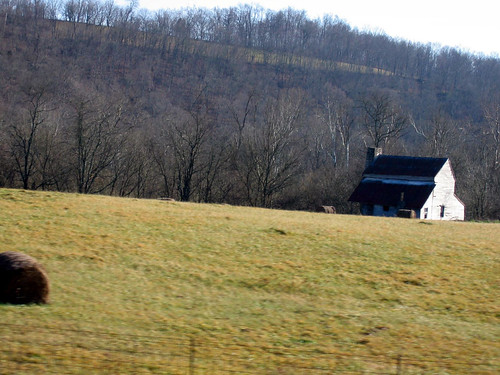
Cabin without electricity in Rowan Co., KY.
(*photo credit)
November 15, 2012 Renewables & New Electrical Generation Capacity
Renewable energy sources (hydro, wind, biomass, geothermal, and solar) are rapidly entering into the grand electricity generation mix in the U.S. and most other industrialized nations. According to the Federal Energy Regulatory Commission, in the first half of this year 229 U.S. renewable energy projects accounted for 38% of the new electrical generation capacity. According to a "Sustainable Energy Coalition Report" the various projects included 50 wind projects (2,367 MW), 111 solar energy projects (588 MW), 59 biomass projects (271 MW), 5 geothermal (87 MW), and 4 hydropower projects (11 MW).
The U.S. non-renewables are uneven in expansion with nuclear, which has added no new facilities, and has numerous aging plants becoming candidates for denial of license renewals. On the other hand, there were 2 new coal-burning facilities (1,608 MW) which are quite large in production capacity and yet followed by few more due to environmental restrictions and the lower cost of fracking for natural gas products. In fact, in the time period just mentioned, 40 new U.S. natural gas units came on line with a capacity of 3,708 MW or 42% of the new electrical generation totals -- making this a larger source than the combined renewable energy ones.
These trends are in keeping with studies showing that the future American electrical generation picture is changing rapidly from that of heavy dependence on dirty coal-fired power plants to natural gas and renewable ones. Some say a rule of thumb is that a decade or so from now there will be one-third renewables, one-third (or more) natural gas, and one-third (or less) coal with nuclear power plants being phased out after license expiration. As of now, renewable energy sources (over half presently being hydro) account for about 15% of capacity, nuclear energy for 9%, natural gas for about 42%, and coal for less than 30% and falling fast.
The rapid changing energy-source utilization makes it difficult to project a future picture in 2050. However, much depends on whether renewable energy sources receive equal favor to the non-renewables and also some incentives for further development. The hidden wild card is the presence of natural gas as a cheap energy source. This past summer wind power hit a record 57% of Colorado's electricity for a short period of time while testing for integrating larger portions of wind into the traditional generation network. An ability to transmit wind power to various parts of the total system is what many foresee as the potential for renewable's growth. Wind does not pollute the air, takes no water (and thus saves billions of gallons used by other sources), and is falling to competitive price ranges with coal and even natural gas. Furthermore, vast potential for expansion in American northeastern offshore areas is just now being explored and developed.
Prayer: Lord, teach our people to focus on renewable energy
sources to replace dangerous and environmentally costly ones.
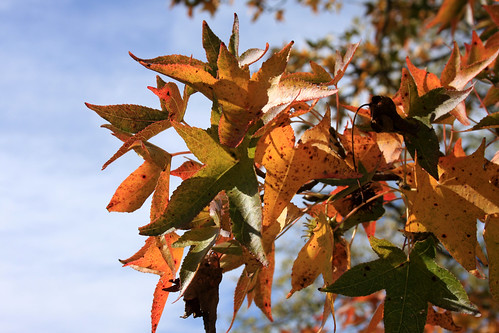
Leaves of the sweetgum in autumn.
(*photo credit)
November 16, 2012 Tolerating the Pain of Damaged Earth
This is why the country is in mourning,
and all who live in it pine away,
even the wild animals and the birds of heaven;
the fish of the sea themselves are perishing.
(Hosea 4:3)
On this International Day for Tolerance we must distinguish those for whom tolerance is due, along with issues and conditions which should not be tolerated -- because they hurt others. Tolerance does not mean we must be wimps. We tolerate people; we do not tolerate their social misdeeds unless they are so personal to us as an individual that we have to accept them. But if their misdeeds are not directed to us as individuals but to any of our neighbors we must speak up and defend our brothers and sisters who are being hurt. This sense of watchfulness and refusal to tolerate misdeeds also extends to Earth herself. We do not tolerate polluting actions in some sort of misguided sense of acceptance.
Amid the nakedness of our landscape when misdeeds are so blatantly observed we ask ourselves questions: Are we in touch with damaged landscape, or do we flee from the sight of something that is hard to view? Doesn't it take a deep spirituality to perceive suffering and accept our role as being interiorly at peace and yet exteriorly willing to show anger for harm done to our Earth? If we choose to be present for even brief periods, do we stand in silence and feel and listen to the sobbing of the countryside? Are we deeply touched and moved to action? Does the land itself mourn, demanding our stamina, concern, compassion, and the grace of hopeful betterment to resolve to do something more?
Coming to an awareness is insufficient; we must act to reduce the suffering, stop the pining, and put an end to the perishing of the land's species. The task before us is immense and demands courage. We are called both to be passively present to suffering and to make our presence felt in very creative ways; we are drawn to resolve to confront environmental abuse. Like Jesus who was both merciful and angry, we are to develop a more perfect and balanced interior ecology. Then we will confront the crisis of climate change and work to find and implement solutions that work.
Two aspects of an eco-spirituality include first a call for ultimate action by knowing the HERE and NOW through immediate observation of how deep the damage is and how it cannot be tolerated. The second aspect is to join in community with like-minded individuals and groups, the WE, to bring about change at the grassroots level. This sense of grassroots, reaching beyond our local concerns to being global partners who work together, is a key to spirituality today. Compassion demands public action, letters, demonstrations, gatherings, marches, organizing, encouraging others, writings, and prayers.
Prayer: Lord, teach us that we have a mission to do with others, and give us the courage to do it.
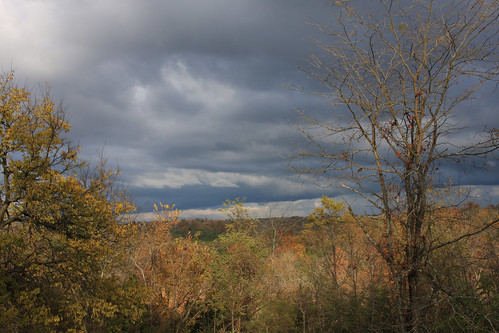
Hues of the wintry November sky.
(*photo credit)
November 17, 2012 This Has Been a Hot Year
Need we complain about how many days the mercury went above 90 degrees -- or in some places 100 degrees Fahrenheit? We know our own little world and personal experience, but it is far harder to prove that weather conditions are above normal. Experiencing the measured heat is easy; proving that it is getting hotter is another matter and the analysis of previous records is not easy.
The year 2012 started with an expectation of a record corn and soybean harvest, but after the hot summer and drought that has been proved quite very farfetched, at least in the case of corn. Thus has resulted struggling farmers and higher than expected vehicle fuel prices -- corn growers contest whether it affected food prices much since the farmer gets so little of the grocery bill. Recently Dr. James Hansen (mentioned in our previous reflections on global warming) co-authored with colleagues a paper for the Proceedings of the National Academy of Science, showing that what was normally unusual in weather patterns is now normal. The team performed a statistical analysis using data for 60 years (not including this year's heat wave) from 1951-2011.
This data divided the planet into cellular units of about 150 miles and compared decade long blocks of average surface air temperatures. They created a reference summer temperature value from the years 1951-80 in the Northern Hemisphere and then calculated deviations for each decade. These are standard bell curves with peaks moving to the right with each decade showing acreage temperatures inclining to the hotter side, as many of us have already become aware. The more general statistics are bearing out what we already know -- except for the agenda of merchants-of-doubt's constant attack on increasing scientific evidence of the human causation of global warming/climate change.
The crux is the issue of doubt that becomes a topic for talk shows and other media outlets. For those desiring controversy to please advertisers, the die is cast that there is doubt here, and this gives entre to the doubters as though they have equal legitimacy. This is especially true when it comes to proposed human action to reduce climate change: renewable energy alternatives on a level playing field; removal of tax perks for big energy and its bosses; and advances in energy efficiency measures.
The controversy is not over emerging scientific consensus anthropogenic effects. Rather, should we tolerate foot-dragging related to climate change practices that create billions of dollars in profits for fossil fuel pushers? Oil is an addictive substance, as is dirty coal and natural gas. The longer cigarette smoking went unregulated after cancer causation was proved the more profitable status quo practices. A steamy hot 2012 triggered a debate over tolerating climate change practices or renewable energy rightful successors (wind, solar, hydro, geothermal, and tidal).
Prayer: Lord, give us the courage to know what to do and act.
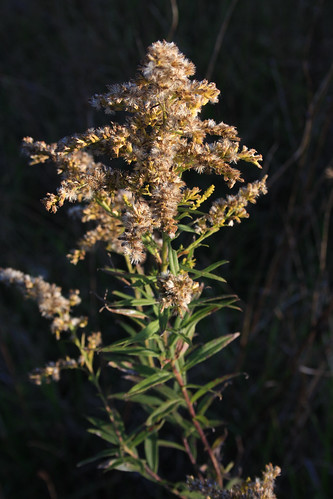
Appreciating the last of the goldenrod.
(*photo credit)
November 18, 2012 Global Changes and Signs of the Times
We are coming to the end of the Church Year and the liturgy continues November's meditations on the last things (death, judgment, heaven, and hell). On this 33rd Sunday in Ordinary Time we focus on signs at the end of the world and apocalypse. This is not our favorite subject but deserves a word. It goes beyond detecting weather signs (see 10/27/06) though we recall in several Gospel passages Jesus urges us to observe the weather accurately and realize what is expected to occur. Weather is not climate, nor can our fairly accurate prediction of tomorrow's weather at the local level predict next year's or a longer-term climate change:
* Tomorrow the signs show that it will frost;
* Winter is coming and days are getting shorter;
* Higher seas are starting to happen and will continue.
All three of these observations are worth noting, but from different sources: the first is our common sense experience with weather; the second is from forecasters who are right most of the time using state-of-the-art observational practices; and the third is from authentic and respected climate scientists and their analyses. Prudence requires us to listen to all three.
Apocalyptical alarms have limited value and must be interpreted properly. Overuse turns people off; vivid descriptions disturbing the mentally unbalanced; those needing lifestyle changes find discomfort -- and maybe for the better. People are free and some read and hear of signs and yet continue hurting their own lives. However, signs of the times deserve seasonal observation and reflection, but drawing immediate conclusions from them is
not obvious. Certainly, if signs show impending global health problems, we must change our ways, and prepare to confront the issues with proper resources. The global warming alarm requires a cautious approach, not panic, for "Fire" is a rare warning.
Severe weather has struck in recent years in the form of floods, hurricanes, drought, and severe winters: too much or too little water, too much wind or too cold or hot. A recent National Geographic has an entire section entitled "Weather Gone Wild" (Sept. 2012, pp. 30-55) that has a telling chart of severe American weather causing damage of one billion dollars or more ($329 billion from 1980-95 and $541 billion from 1996-2010). Climate experts are convinced that these are exacerbated by human activity. Reading the signs of the times is worth our while in areas of both common sense weather observations and expert warnings. Let's use urgency and caution but proceed to work with diligence and a sense of interior peace of soul, knowing that God is in charge but we are responsible to follow the prompting of the Spirit. Signs are not to be ignored for they speak to us individuals, our communities, and our Earth herself.
Prayer: Lord, clarify our understanding of justice in these times; give us the courage to change our ways, to adopt temperance in our actions, and prudence to effect these changes ASAP.

"Tire Dragon" folk art.
(*photo by Guy Schmidt, Creative Commons)
November 19, 2012 Recycling Old Tires in Different Ways
In America, casting off tires amounts to well over one tire per person per year. Reducing this waste product by extending tire life on vehicles could become a major safety issue through reduced braking performance. In our safety-conscious society auto tires are replaced at a fast clip -- and the problem is what to do with discards. Personal uses run out fast, because the old tire swings tied to the branches of trees were a common sight in depression days, but not seen often today. Using tires for holders of potted flowers or even vegetables such as sweet potatoes are rare and limited. Even gardeners can only stack so many tires and afford layer after layer of potatoes with each new ring. Such a practice is a rarity. Fashioning tires into sandals is known in poorer countries, but few like to resort to this recycling gimmick today.
Actually, a utility of old tires in large numbers and with great benefits is now hitting the market, namely use in road-paving materials. The tires are shredded and particles are inserted in the binding materials of asphalt with actual improvement in durability. Reusing old tires in such a utilitarian process has numerous benefits and advantages:
* Removes solid waste disposal problems since these bulky tires can fill landfills rapidly and remain long uncomposted;
* Reduces noise pollution by paving roads with old tires as part of the paving materials. Engineers say that use of such materials cuts traffic noise by 25% and results in quieter roadways. Reduced noise means reduced discomfort, stress, and even heart attacks. Technically speaking, tires help thicken bitumen binding and allows for larger air bubbles that soften sound;
* Substitutes for expensive constructed road barriers that have only limited effects on windy days and are an eyesore for many residents who don't want to live in walled enclosures;
* Replaces extra primary asphalt materials with savings in energy and resources. Bitumen is an oil product and this raw material when utilized adds greatly to paving costs; replacement of a certain amount by old tires reduces fossil fuel use;
* Lowers paving costs as discovered in America (20,000 lane miles per year now being repaved) along with extensive and increased use in China, Germany, Brazil, and Spain.
Competition is brewing even as tires get further road-paving use. Future materials for paving using a polyurethane plastic in road building is adding basic rubber as a key ingredient -- though the product is expensive and may have a heavy carbon footprint. (See The Economist, June 30, 2012, p. 82).
Prayer: Lord, teach us to use the good things we have and to
reuse them when opportunities permit.

Artistic sculpture work by beaver. Washington Co., KY.
(*photo credit)
November 20, 2012 U.S. National Decline or Number One in Change?
In some final remarks by Gore Vidal before he passed from this mortal scene, he spoke gravely about the decline of the United States. His physical decline, yes; America's, perhaps or perhaps not! Another way of viewing the current trends is to see that we can wake up to our consumerism, multitude of advertisements, and enormous per capita resource wastes and take a far different type of leadership so needed in the fashion-seeking world today.
We can become leaders in regulatory globalization. "Federalism" may be the proper concept and we need to treat this again as its role becomes clearer, for models such as Switzerland, Australia, Canada, and this country are worth expanding to vast continental groupings and to the community of nations. Here we can possibly take a leading role, not of competing and over-excelling over another, but of acting as a sharing neighbor to help ease travel from place to place, to advance financial and commercial advantages, to share burdens such as drought or flood damage, and to obtain mutual security that is so necessary in this conflict-prone world. Sharing success with others such as the European Union, the African Union, or the association of Latin America countries is an opportunity in our American political maturity, not competition in winner/loser games of our less insightful childhood.
The U.S. federalism was a brilliant insight, but did not come to full fruition until after our bloody Civil War ended slavery. However, by extending voting to more groups (propertyless males, blacks, women, Native Americans and 18-year- olds) did we see the roles of all citizens. The process of mutual sharing within our country is far from complete and civil rights struggles continue. Vast diversity of wealth, existence of hunger in a land of plenty, and failure to gain energy independence are all part of our unfinished business that requires additional legislation. With a strong contingent wanting to reduce the role of government, we find that challenges still facing us in our ongoing process are formidable. Furthermore, moving to globalized sharing requires additional work and persuasion.
All things considered, we Americans have a national learned experience to share with others: national security measures and good governance (Africa), undeveloped oil and gas resources (Southeast Asia in the China Sea), and banking and financial resource regulation (EU). In none of these areas is the United States perfect, but it does have a functioning homeland security, a network of pipelines and shared energy processing, and shared debts and financial risks. We suffer from a lack of proper social network in health issues, a fair tax system to limit aristocratic wealth, and a global control over tax havens. We do need to overcome our own current paralysis of governing due to competing philosophies. Our vulnerable democracy needs watchful guarding.
Prayer: Lord, teach us to share experience in humble ways and to see that we have much to offer and share in a troubled world.

Fowler's toad (Bufo fowleri), under cover of lawn grass.
(*photo credit)
November 21, 2012 Preserve Us from Our Selfish Ways
As this drought-ridden and contentious year draws to a close, and we prepare for our national feast of gratitude this week, we ought to explore the selfishness that crops up among so many in our troubled land. However, let's recall that in times of floods and other troubles most Americans come out, and selfishness is abandoned and pushed out of sight for brief periods of disaster.
Notwithstanding moments of cooperation, we have a darker side, which is the Ayn Rand approach to life in all its atheistic ramifications as found in "The Virtues of Selfishness." Perhaps it is a selective and ideological interpretation of Scriptures, but the selfish ways of many are popular. It may be one competitor getting ahead of another or a business dirty trick, or a person seeking to get what he or she holds is an "entitlement." It may be an elderly person scrambling to get more, or a person who is far back in the pack wanting to walk over others. Furthermore, it could be success of billionaires who rewrite legislation and pay very little in taxes. Their selfishness becomes a national model.
Selflessness is championed in spiritual terms. A host of passages both in the Old and New Testament deal with love of neighbor, service to our fellow human beings, care for those in difficulties, forgiveness of debts, encouragement to the dispirited, service to the stranger (Good Samaritan), the Golden Rule, washing of the feet of the disciples, and healing the infirm in numerous places. All of these testify to the demands on Christians to be selfless people, and the more one acts selflessly the closer one comes to be part of the Body of Christ.
Selfishness is exposed in all its ugly character in our world. A world of massive affluence is what is at the heart of selfishness. Much has to do with individual monetary success and a road to one's own glory, at expense of others or simply overlooking their needs. This is more often put in more evident physical and material terms and in monetary privilege. In subtle ways, this could also be a practice of those aspiring for spiritual or ecclesiastical favors. Selfishness can be hidden and at the heart of efforts for renown or top position; it can be coated in terms of heroism or the aspiration to become privileged.
Does spiritual selfishness exist? Reflection is our moment of examining self to uproot selfishness from our hearts. Over attention to self is not healthy either. Some prefer to omit self-examinations for fear of becoming too self-centered, and there is some merit to this caution -- but only some. Through sensitivity we learn the needs of others and return to self examination when we find our limits to giving are within our heart. We must examine self so that we can become more selfless.
Prayer: Lord, help us to give and not to count the cost, to labor for you in all it takes, and to leave what needs polishing in self up to you, the master jeweler of the universe.

Two lovely nymphs of the stink bug on garden fence.
(*photo credit)
November 22, 2012 Gratitude Could Be Our Salvation
We are celebrating our national Thanksgiving feast, an event that has a long history but with some folklore. However, we have learned as a nation to thank God for gifts given. If we cultivate this gratitude we discover a saving grace for people and nation. Let's look about and find those points of special thanksgiving:
* A land committed to giving thanks on a national basis;
* Wonderfully endowed land with majestic mountains, rich forests, fertile plains, freshwater lakes, and seashores and abundant beauty to attract tourists;
* General religious spirit that includes thankfulness;
* The grace of a safety net and adequate food materials for our people who suffer from lack of essentials;
* Basic awareness and quick response in times of disasters;
* A secure transportation system to allow the flow of commerce;
* An ability to communicate well with our neighbor in a dependable postal system and through an accessible internet;
* An educational system highly prized throughout the world even though costs exclude many lower-income folks
from easy access;
* Freedom to speak and practice our religion in general,
with some exceptions that are being contested;
* National compassion for those throughout the world who are suffering from poor health and lack of food;
* A sense of sharing experience in governing our federated republic with those in other lands;
* Established constitutional guarantees of racial equality, even though infringed upon in some individual cases;
* National pride in athletic programs that strive to bring out the best in our young people;
* Judiciary system that is generally free from corruption;
* Imperfect but dedicated health system meant for all the people that includes emergency service for most in need;
* Ability to contest issues in a generally open and forthright manner;
* Stable financial system with low borrowing costs;
* Experienced and innovative people who can rise when conditions demand change;
* National security in military and police forces though also beset by lack of gun laws and limited ammo access;
* A national research structure that covers many critical areas of health, food safety, and environment;
* Desire for unity and national pride;
* An imperfect history that is told honestly so we can learn from our mistakes; and
* A dedicated President throughout his term.
Prayer: Lord, we thank you for the good things that are part of our world, but we also beg for the grace to help us use these
gifts in a more perfect fashion.

To our Earthhealing.info readers:
We deeply appreciate your interest in our Daily Reflections and hope to continue to produce them in the coming year -- Lord willing. However, we find escalating expenses harder to meet. We are still able to produce these daily offerings at about 0.1 cent (one mill) per hit, but at 16 million hits per year, it is more difficult. We also strive to turn out several additional publications each year that can also be found on this Website. Two additional books are slated for 2013. Our goal is to show that the poor can rise and heal our damaged environment.
Much of the Earthhealing funds come from my salary at two small parishes in a low-income portion of central Appalachia. I do not take fuel costs for most of these church-related trips. However, in reality, bills mount. Thus, any help you can give will ensure the continuation of this informational Website. Feel secure that you are contributing to a daring approach that many others hesitate to espouse, even though in their hearts they agree. Likewise, your generosity is received with deepest gratitude, and we guarantee that the funds donated will be used entirely for healing our wounded Earth.
Happy Thanksgiving!
Al Fritsch & Earthhealing Team
Mailing address:
Al Fritsch, SJ
316 5th Street
Ravenna, KY 40472

Tickseed-sunflower, Bidens aristosa, along roadside. Rockcastle Co., KY.
(*photo credit)
November 23, 2012 Consumerism, Permissiveness, & Never Saying "No"
Black Friday is the day materialism is hard at work convincing consumers to panic and buy whatever is desired -- and to always desire and buy more. A permissive people aware that their elders had to go in need during the Great Depression will do much to insulate their offspring from such conditions. People bend over backwards for the materials that they found wanting when younger, or recount tales of lack of fresh food, new clothes, or convenient domestic devices. For this reason, if one can obtain credit to acquire whenever a loved one whimpers, the culture responds, "give them what they ask, for we teach them well to call for specific things and never to be totally satisfied."
A permissive culture is one that never says "no." The discipline of fasting is far from the mind, and certainly after yesterday's feast. Unfortunately, the day of national gratitude is followed immediately by today's "Black Friday," which recasts the eyes of all on the god of materialism. The grateful souls of yesterday turn quickly to the mad rush of Christmas shopping, as though the holy name will sanctify the materialism of the rush. From midnight, some consumers line up at high ticket item sales at many shopping malls. Get them to the store for massive savings and what they saved can be extracted from them in other displayed items; it is a national sweepstakes for the cash in the pocket.
Permissiveness is targeted to individuals who allow themselves to indulge to the degree that credit card and ready cash allows; it involves a lack of calculating costs or properly figuring present funds due to faulty math, laziness, or wishfully being willing to try to live "higher on the hog," as the old expression goes. This economic permissiveness extends to families with nagging and rather persuasive youngsters who strive to keep up with their peers. For tranquility, individuals within the family unit are allowed additional things -- and soon permissiveness is the rule.
Permissiveness goes beyond the individual stampeding buyers we witness today. It includes a nation that encourages increased consumer spending, allows underwater mortgages (until the banks start foreclosure proceedings), overlooks overdrawn bank accounts (taking a very short time to build up), and permits just about anyone to buy a thousand rounds of ammo for hunting or security. The trait of material permissiveness is directly related to our consumer economy and the implicit "patriotism" associated with buying more than one can afford or one needs -- and basing economic progress on consumer spending.
On Black Friday say "no" to excessive spending at both individual and national levels. Say "no" to a consumerism that fuels a dysfunctional economy. To refrain from shopping today is a mark of understanding the gratitude shared yesterday. Stay home.
Prayer: Lord, teach us to say "No," not only to things that hurt us but to any excess of good things as well.

Bright coralberry (Symphoricarpos orbiculatus) provides fall woodland color.
(*photo credit)
November 24, 2012 Eight Ways to Curb Over-Consumerism
During this Saturday after Thanksgiving let's reconsider our purchasing habits. If 70% of the American economy depends on consumer purchases, it may mean we ought to be all the more hard-nosed about what we get, as well as try to redirect that economy to more services for the needy, unskilled, and disabled.
1. Avoid "window shopping." The fact is that we are plagued with tens of thousands of advertisements in the course of a year. It is hard to count because we are willing to overlook many -- but we ought to have still greater "modesty of the eyes."
2. Ignore a flashing "save" sign. This is not a saving but an allurement to spend. If our people could save so much, why is there a consumer indebtedness of trillions of dollars?
3. Decide what is needed. Too often buying is a free hand to possess something and then finding an excuse (gift for relative or friend) to make the purchase. Have in mind what you intend to buy and list specifics of how it satisfies your immediate need.
4. Halt impulse buying. We hear or see a new product (domestic or professional) and are drawn to buy it for some immediate reason or just because it seems a good deal. The best advice is to wait one week or one month and return to a consideration. Most likely, the impulse to buy has evaporated -- and shouldn't have been entertained in the first place.
5. Think twice. We are just at the point of buying something and ought to ask ourselves -- Is this really needed? What if it isn't what it is claimed to be? Is this destined to be regretted?
6. Be critical among others. We most likely have a heap of bad or less than perfect purchases around. Had an expert suggested not to purchase this or that item, would we have listened? Do we ever ask potential consumers whether they really need or simply want this item? Is there peer pressure involved in seeking this purchase? Are you willing to say "Don't be fooled"?
7. Be critical with self. Have we learned from the experience of a bad purchase, whether a small item or a house or automobile? Most of us hesitate to admit such mistakes, for consumers are possessed with a self-righteous "knowledge" of what is best for them. Do we use the excuse that the discards will go to charity?
8. Recycle a bad purchase. If you can't return the bad buy, please don't just pass it off on a passive neighbor. This perpetuates excessive consumerism. Be creative in a new use and let it be a reminder that we will not let this happen to us again.
Prayer: Lord, teach us how insatiable materialism will grow on us if we do not take disciplinary steps. Help us act responsibly
when it comes to purchasing goods.

A quiet autumn path.
(*photo credit)
November 25, 2012 Thy Kingdom Come: We are Called to be Catalysts
"I am the Alpha and the Omega," says the Lord God, "the one who is and who was and who is to come, the almighty."
(Revelation 1:8).
On this feast day of Christ the King, we focus on the kingdom of God, not the kingdoms of this world's power brokers. We pray that the kingdom of God comes and that God's reign is triumphant. Too often we reflect on just how far we are from the fullness of that Kingdom. History moves on but so slowly that we lose the picture due to immediacy of current needs, with all their risks and benefits. A longer view shows a growing awareness of an emerging world order where peace and justice have an opportunity to emerge.
The Kingdom of God is a work in process, of people coming together and respecting the rights of others, of doing away with slavery, of tackling immense poverty, inadequate health care, and homelessness that plagues so many, of conflicts demanding joint international action, of climate change practices worth addressing as a world body, and of the tax havens that allow escape from tax responsibilities. It is easier to list the imperfections that surround us than the solutions needed. The United Nations functions amid its imperfections and God's kingdom is coming. We pray for doing our part and to hasten its completion.
We are the agents of change who must catalyze the process of establishing the Kingdom. We are like yeast in the dough, small points of light, human catalysts. This means we must be at the right place and with such stability that we can endure the change process. We must hasten the Day of the Lord because we believe in God's reign and are dissatisfied that it has not yet come to fruition. Come Lord! This is our refrain and it gives us strength to act as ever more effective agents of change in this time. God has given an awesome mission to his Church to serve as catalytic agents of change by working as units in cooperative endeavor. We are not in charge of the coming reign (God is), but we have been given an illustrious role of acting in the world to bring about that change -- to hasten the coming of the kingdom.
Our prayer has various nuances: we pray with a vision that an imperfect Kingdom will be realized in its fullness and that Christ is seen as king of all the Earth; we pray that we are part of this effort and see the needs that are ahead of us as being so urgent that we take part to the fullest degree possible; we pray that we can work together with others to bring this about. Thus there is a multiple aspect to our prayer: knowing the situation in its full ramifications; realizing our need to enter into the urgent work before us; seeking courage to unite with others to serve as effective agents of change; and a sense of hope that God's kingdom will triumph in the future.
Prayer: Lord, we pray again the Our Father with special emphasis on the words "Thy kingdom come."

A diverse autumn collage.
(*photo credit)
November 26, 2012 Ethnicity in Motion: Ethnic Atlas of the United States
Did you ever work on a puzzle for thirty years and still find it not quite finished? I prefer real puzzles and the most enduring and intriguing one was, and is, "What is the ethnicity of Appalachians?" Clues: the answer is found on U.S. decennial census reports but even this is somewhat imperfect. In the course of finding an answer, the puzzle territory morphed into the entire nation due in part to the porous boundaries of Appalachia and the realization that the ethnicity of the entire nation is also in question. The question broadened to this one, Are we as a nation becoming more amalgamated or more diversified?
This broader and more intriguing question would have many giving one or other answer, but what is the true picture? My emerging answer is in favor of growing diversification. We compare our four sets of census data on ethnicity and racial groups for 1980, 1990, 2000, and 2010 along with information gathered from a host of other sources. Solving the puzzle began in the 1980s with a book advance from "Facts on File." For a brief period in the 1990s I was discouraged because the 1990 ethnicity picture differed so much from the decade before. The next set in 2000 clarified some of the changes, and so we awaited proof from 2010 data now available and being analyzed. Janet Powell and Mark Spencer have helped me develop four sets of 50-state maps showing the predominant ethnic groups in each of the over 3,000 counties of the United States. We are not yet updating the 1980s data accumulated with visits to 25 major metropolitan areas, but these await future comparison. Ethnicity certainly changes with time and we observe that the English component has decreased and the Hispanic one has vastly expanded.
We are in the process of determining how to make these findings available to the general public. Making this discussion of states (not urban areas) available, along with an introduction to a discussion of results is an ongoing undertaking. What is forthcoming is an analysis of the vast changes that occurred almost silently and without fanfare behind the mountains of statistics that make up America's changing ethnic landscape. Granted, we coupled some allied and related groups (Scandinavians, Slavic, Asian Americans, and others) when needing to contrast at local and regional levels; we clarify these on the resulting maps.
We will make this material available shortly through Brassica Books for a modest fee to help recoup expenses and to allow for the continuation of the project beyond the span of my fading eyesight. By going to the listing at the start of this website one can obtain directions on how to sample the map sites and how to obtain these maps in digital format. Our process is somewhat restricted by lack of time to complete the project, but it certainly is coming to temporary closure.
Prayer: Thank you, Lord, for the grace of persistence.

A tough katydid finds surviving foliage upon which to graze.
(*photo credit)
November 27, 2012 When is Tough Love the Right Option
"Tough Love" occurs when a person must accept that an unpleasant option for a loved one is really the only way the person will be able to change his or her current condition. It often targets drug or other substance abusers after exhausting other remedial but unsuccessful attempts to help. From the point of view of a pastor, this is never an easy matter to discuss with either the ones desiring to execute tough love, or the subject of the controversy. No one wants to do it, and yet often it must be done. Toughness is hard to advise, hard to give, and hard to receive; all agree it ought to be avoided whenever possible.
No doubt part of the problem may extend to others beyond the individual, who is really only part of the target area. Perhaps permissiveness in the past by loved ones has been excessive and now the results are beginning to appear. Strict conditions are now hard to apply and to receive. However, the neutral advisor soon senses the delicate situation and is hesitant to dwell on guilt and blame -- for enough is already at the surface. Often the partner or family of the person needing love has been too lenient when a stricter approach may have led to necessary changes in behavior. We Americans allow malpractice to occur uncontested for a length of time to the detriment of culprits, or to others with whom they are connected.
In an act of desperation for the loved one, parents will deny a careless teenager use of a vehicle, or a drug offender is denied financial assistance. It may lead to unpleasant hostility or excessive domestic conflict, or even cutting off contact with the offending party. In time civil arrest or jail time becomes part of "tough love." Consider these basic steps in such procedures:
* Pray over the matter, and do not just act from emotion.
* Initiate the action with the help of others who are regarded as solid backers of the tough love decision. "I am doing this after conferring with ----- and ----." This adds weight to the decision and makes the reaction somewhat muted, for others have become involved, but conferring with outsiders for advice could bring on strong reaction by the candidate for tough love.
* Make the decision final with no turning back -- though much depends on the history of past leniency and tolerance.
* Be confident that a threat of tough love may have positive results -- though it may not. Make it known that this is an act of love even if an unpleasant form of discipline.
* Express confidence in benefits from the tough love action.
Prayer: Lord, give us courage to act as administrators of
tough love, and/or humility to accept it as recipients.

A surprise cache of ants inside cedar log.
(*photo credit)
November 28, 2012 Protecting the Commonwealth from Billionaires
During this long and overwhelming presidential campaign, one party favored a government that did not have a "right" to take money from the wealthy. Our nation's founders held that all rights come from God. However, these rights do not grant special privileges to those who have an unusual share in a limited pie. Pies do not grow indefinitely as many materialists believe, for material resources are inherently limited. Conflicts over right to property versus right to essentials always favor the latter. The government as arbiter in such disputes must rightfully act.
The commonwealth is a technical term applied to certain nations (British or Russian Commonwealth) or to certain of the United States (Kentucky, Massachusetts, Pennsylvania, and Virginia by designation and Delaware and Vermont within their constitutions). The designation does not set these states apart, but rather emphasizes that government is based on the common consent of the people. Wealth is really the public welfare, the res publica of Roman times. With evolving democracy, this means that the "public arena" is where commons is shared, not privatized to certain individuals and dispensed according to their will.
Why an election year issue? Because if privatized wealth buys nominations and elections our very democratic roots will be uprooted. Ben Franklin feared this might happen. Never before in our history has the stark reality of a democratic principle of essential rights of people having precedence over rights of private property (no matter how acquired) been so highly challenged.
The divine right of billionaires is a horrifying myth that would have unsettled certain ones of our founding fathers. Even if we conceded that certain individuals "earn" that wealth -- and this is highly disputed -- it does not mean they have a right to retain what should be part of the commons. When our public welfare is threatened by private autocrats, the citizens as true protectors of the commons have a right to remove and redistribute this wealth for the good of all. Interestingly, this is a basic concept of common law and Christian (and others) concepts that go far back into history. As defenders of the commonwealth, we question the rights of billionaires to retain their ill-gotten "property." This must be challenged publicly, and every effort be made to keep such doctrines from becoming part of our elected legacy.
Defend the commons. We the people must defend the liberties that were won at such a high price of human sacrifice. Private individuals feel they are blessed by God and privileged to control their accumulated wealth as they see fit. Not so, and citizens must speak out on this issue. Will everyone affected speak or are they intimidated in some way? If members of designated "commonwealths" the need to do so is all the more imperative.
Prayer: Lord, give us the courage to face our current problems and discover as dutiful citizens meaningful means of response.

An old swing finds new life at garden's edge.
(*photo credit)
November 29, 2012 Balancing Physical and Spiritual Demands
Some seek a comforting religion, that is one that gives them affirmation that what they are doing is proper in all aspects. A materialistic religion reinforces the drive for material prosperity; the minister is an example of success with growing congregations, diamond rings, and private jets. If the followers are good they can become like the leader and have material success. It is a sort of shell game and those in poverty are often tempted to play it. This is a way out of situations of drugs, crime-ridden streets, and unsafe places to live. The offer to get out of a bad situation seems most enticing and the goal of wealth lies ahead.
Certainly a goal of continued poverty or extreme destitution is to be avoided. What is a middling position -- middle class values?
The goals of the poor include the somewhat tarnished "American Dream." The promise of winning a jackpot is remote. More promising is to form strength in solidarity and take what is rightfully coming to the poor. That is better than going hat-in-hand to beg from the wealthy and express gratitude for the little given. Hopefully, essential material goods can be attained through solidarity and cooperative endeavors for the group and not the individual. Here spirituality takes on a deeper definition of omitting the tendency towards individual physical wants (insatiable materialism) and directing actions to physical needs (sufficient to keep body and soul together for all the people).
A "spirituality" that advocates patience for the poor and yet does not show impatience to the rich is unauthentic, and merely the handmaid of the god of prosperity. The effort to allow goods to trickle down is inadequate for it does not happen. That is not true spirituality but a perversion, for it rests on the god of prosperity making them individually successful. Pay the false prophet enough and you will become successful. Prosperity religion becomes more difficult to believe during rough times like these.
Individuals working alone do not have the answer.
Authentic spirituality involves a community, and one acting in a non-violent fashion. The group security and progress depends on obtaining essential needs for all, and success rests in doing this action in solidarity with others. Jesus encourages us to unite; he teaches, heals, forgives sins, and drives moneychangers from the temple commons. Jesus wants us to be active participants in initiating the reign of God here on Earth and not patiently awaiting a future happening. The sacramental life energizes us to act; the Spirit inspires us; the way of Christ involves reaching out and meeting and balancing all human needs, physical and spiritual. We tend to improving our individual practices so that our collective action can become more effective. The goal is working together to make a lasting kingdom of peace.
Prayer: Lord, as Advent approaches give us a balanced outlook for reducing the uncontrolled demands to satisfy individual wants, and to recognize the authentic needs of people everywhere.

View across Laurel Lake. Laurel Co., KY.
(*photo credit)
November 30, 2012 Kairos, Chronos, and Advent
The Greeks had two words for time: "Kairos" or the opportune moment; and "Chronos" or the time we measure by the clock as sequential time. For many of us, we designate our time as that hum drum flow from day-to-day punctuated by timely events that stand out in unforgettable fashion -- the nodes in our symphony of life. Special events include Kairos moments when important decisions are made or at least offered. These special Kairos moments can be neglected or deliberately refused, for we are capable of passing up grand opportunities. Kairos is this broader NOW that exceeds the passing moments of the ticking clock. We are aware of this precious present moment so different from our past and future, and yet both separating and connecting them into a life experience. NOW we must reduce the impact of global warming that is HERE -- if WE only act responsibly at this time. "Reclaiming the Commons" is a global Kairos event.
For Christians, we approach the Advent season when we celebrate the Kairos moment of world history, the coming of Christ into our midst. However, this advent of Christ was an historic event in calendar time, and yet it remains eternally an opportune invitation for us to receive this coming into our own hearts. It is a Kairos always present in chronological time. We enter into this spiritually significant event and can respond in ever deepening levels of commitment. Here we are invited into an eternal NOW.
In Sacred Journey (Summer, 2012, p. 64), Susan Corso calls Kairos "holy" time. While most of what she says about taking advantage of moments for retreat is well said, one could differ on what is "holy." Yes, the busyness of daily life is measured in Chronos but so can restful moments. "Rest" as space between times of work is measured by a clock, but the rhythm of rest and work is not between Chronos and Kairos. This symphony of life needs periods of both, of which one includes retreats on an annual or periodic basis. Our spiritual balance is working towards holiness that rests in the process and not merely in the special times of rest. Responsible adjusting of the process often comes during retreats, and so it has a spiritual housekeeping function -- but our work life is an integral part of our journey to holiness.
Within this life journey we have moments of opportunity, possibilities for a better future informed by past experiences. Retreats are necessary, but hardly more holy than putting courageous decisions into effect in our working day. Implementing decisions in a busy world is praying always. Kairos are moments when the Spirit speaks freely to us, but we should always be listening and willing to respond in our continued conversation. Holiness is in the journey, and that is just as important as the restful interlude, both part of the essence of life's symphony.
Prayer: Lord, make us aware that this Advent contains the Kairos moments needed for carrying on our life's journey. |